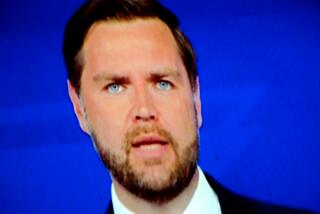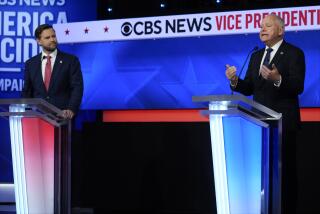Foiled by Relentless Questioning : Focus on Qualifications Hurt Quayle’s Game Plan
- Share via
WASHINGTON — Republican Dan Quayle entered the vice presidential debate Wednesday night determined to transform himself into a political asset by savaging Democratic presidential nominee Michael S. Dukakis as an ultra-liberal outside the mainstream of American values.
Instead, the 90-minute confrontation was dominated by questions about Quayle’s fitness to serve as President and what he would do if fate should someday carry him into the Oval Office.
And, by focusing on an issue that public opinion polls show is troubling for many voters, the debate between Quayle and his Democratic counterpart, Texas Sen. Lloyd Bentsen, could turn out to have a major impact on the still unsettled and closely fought contest for the White House.
It is too soon to tell what judgment--favorable or unfavorable--the millions of voters who watched the event on television will form about Quayle’s performance as he faced relentless questioning from a panel of journalists on his qualifications and what he would do if he became President.
History, dating to 1960 and the encounter between John F. Kennedy and Richard M. Nixon in the first televised debate in a presidential campaign, suggests that perceptions of candidates’ demeanor and personal character count for more in such events than the specifics of their answers on policy questions. And those perceptions do not always emerge immediately.
It seemed clear by the time the debate concluded, however, that Quayle had found it difficult to shift attention away from questions about his own relative lack of experience and onto the question of Dukakis’ alleged liberalism.
And Quayle, who rarely cracked a smile, showed little evidence of spontaneity--a tendency that bothered even some of his fellow Republicans. “I think he probably was over-programmed,” GOP Sen. Alan K. Simpson of Wyoming said.
“I think he had five answers, and he used them over and over no matter what the question,” Simpson said after the debate.
Self-Assured Attacks
For his part, Bentsen, more than 20 years Quayle’s senior and one of the most experienced members of the Senate, sought to underscore his Republican opponent’s potential vulnerability with a combination of self-assured attacks and sharp wit, weighted at times with indignation.
It was the latter that Bentsen used to deliver the most dramatic blow of the night against Quayle. Bentsen took his shot after Quayle had struggled for the third time to answer a question about what he would do if he should suddenly succeed to the presidency.
Quayle, who seemed solemn, even grim, most of the evening, was apparently upset at having that issue repeatedly raised by the panel of journalists. “Three times I’ve had this question, and I’ll try to answer it again for you as clearly as I can because the question you’ve been asking is ‘what kind of qualifications does Dan Quayle have to be President?’ ” he said.
Comparison to Kennedy
After asserting that his experience and accomplishments in Congress offset his comparative youth, the 41-year old Quayle said, almost defiantly: “I have far more experience than many others that sought the office of vice president of this country. I have as much experience in the Congress as Jack Kennedy did when he sought the presidency.”
Bentsen, whose turn it then was to follow up on Quayle’s response, paused for a moment and seemed to measure his opponent like a boxer readying a haymaker.
“Senator, I served with Jack Kennedy,” Bentsen said. “I knew Jack Kennedy. Jack Kennedy was a friend of mine. Senator, you’re no Jack Kennedy.”
As Bentsen’s supporters in the hall cheered and clapped, Quayle snapped: “That was really uncalled for, Senator,” drawing cheers from his backers.
“You’re the one that was making the comparison, Senator, and I’m one who knew him well,” Bentsen retorted. “And frankly, I think you’re so far apart in the objectives you choose for your country that I did not think the comparison was well taken.”
Quayle Taken Aback
Perhaps one of the most surprising aspects of the debate was that, although Quayle appeared to have been well rehearsed to handle substantive questions on a wide range of foreign and domestic issues, he seemed almost taken aback when he was directly queried about the central question regarding his place on the Republican ticket--his fitness to hold office.
The first question directed at him, by debate moderator Judy Woodruff of public television, was why he “had not made a more substantial impression” on Republican leaders as a vice presidential candidate. Instead of responding directly, Quayle offered an apparently rehearsed answer about his experience as a legislator dealing with issues of national security, jobs and the deficit.
“On each one of these issues I have more experience than does the governor of Massachusetts,” he said.
Later, ABC correspondent Brit Hume was the first to ask him what he would do if he were to suddenly take over the presidency.
Quayle paused and then replied: “First, I’d say a prayer for myself and for the country I’m about to lead. And then I would assemble his (the President’s) people and talk.”
Question Repeated
Quayle was asked that question twice more before he chose to compare his experience in Congress to John F. Kennedy’s. Each time he echoed his first answer, citing his experience and accomplishments and deriding those of Dukakis.
After the debate, Stuart K. Spencer, Quayle’s chief campaign adviser, complained that the “the media was unfair” in asking Quayle “over and over” about what he would do as President. “They never once asked Bentsen that question,” Spencer said.
But the questioning reflected the doubts about Quayle’s fitness to serve as President that, fairly or not, have dogged his candidacy since Bush surprised the political world by selecting the relatively little know Indiana senator as his running mate at the GOP convention in New Orleans.
Those misgivings originally stemmed from Quayle’s youth and inexperience. But, as poll results showing Quayle to be a drag on the ticket demonstrate, the public uncertainty about Quayle has not abated during his campaign, in which the candidate has for the most part been limited to controlled situations.
Bentsen also had to fend off some tough questions, notably about his differences with his running mate on such issues as aid to the Nicaraguan rebels--which Bentsen has supported and Dukakis opposes.
Bentsen Avoids Answering
When asked “whose agenda would you pursue” if he became President, his own or Dukakis’, Bentsen did not answer directly. Instead, he sought to stress the idea that “we agree on so many things, and the vast majority of the issues.”
More to Read
Get the L.A. Times Politics newsletter
Deeply reported insights into legislation, politics and policy from Sacramento, Washington and beyond. In your inbox twice per week.
You may occasionally receive promotional content from the Los Angeles Times.










